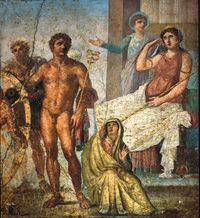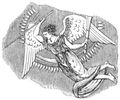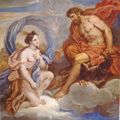إيريس (أسطورة)
| Iris | |
|---|---|
إلهة قوس قزح | |
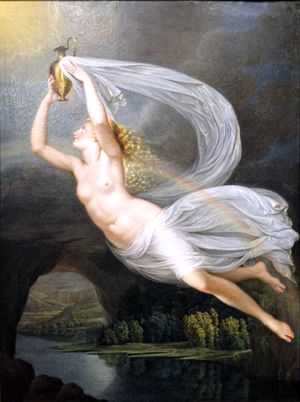 | |
| المسكن | Not specified |
| الرمز | قوس قزح |
| معلومات شخصية | |
| الأبوان | ثاوماس و إلكترا |
| الأشقاء | أركى، Aello, Celaeno و Ocypete |
| القرين | زفيروس |
| الأنجال | پوثوس |
| الآلهة المكافئة | |
| المكافئ الروماني | إيريس |
في الأساطير اليونانية، إيريس (Iris ؛ /ˈaɪrɪs/؛ باليونانية: Ἶρις)[1] هي تجسيد لقوس قزح ومرسال الآلهة.
السيرة

حسب رواية هسيود، Theogony، فإن إيريس هي ابنة ثاوماس و Oceanid Electra، وشقيقة Harpies: Aello و Ocypete. وأثناء معركة الجبابرة، كانت إيريس مرسال الآلهة الأولمپيين، بينما شقيقتها التوأم أركى خانت الأولمپيين وأصبحت مرسال الجبابرة.
أيريس متزوجة من زفيروس، الذي هو إله الريح الغربية. ابنهما هو پوثوس (نونـّوس، Dionysiaca). وحسب Dionysiaca من نونـّوس، شقيق إيريس هو هيداسپس Hydaspes (المجلد XXVI، السطور 355-365).
She is also known as one of the goddesses of the sea and the sky. Iris links the gods to humanity. She travels with the speed of wind from one end of the world to the other,[2] وإلى أعماق البحر و العالم السفلي.
الألقاب
Iris had numerous poetic titles and epithets, including Chrysopteron (Golden Winged), Podas ôkea (swift footed) or Podênemos ôkea (wind-swift footed), Roscida (dewy), and Thaumantias or Thaumantos (Daughter of Thaumas, Wondrous One). Under the epithet Aellopus (Ἀελλόπους) she was described as swift-footed like a storm-wind.[3] She also watered the clouds with her pitcher, obtaining the water from the sea.

الأسطورة
مرسال الآلهة
In some records Iris is a sororal twin to the Titaness Arke (arch), who flew out of the company of Olympian gods to join the Titans as their messenger goddess during the Titanomachy, making the two sisters enemy messenger goddesses. Iris was said to have golden wings, whereas Arke had iridescent ones. She is also said to travel on the rainbow while carrying messages from the gods to mortals. During the Titan War, Zeus tore Arke's iridescent wings from her and gave them as a gift to the Nereid Thetis at her wedding, who in turn gave them to her son, Achilles, who wore them on his feet. Achilles was sometimes known as podarkes (feet like [the wings of] Arke). پوداركس Podarces كان أيضاً الاسم الأصلي لـپريام، ملك طروادة.
Iris is frequently mentioned as a divine messenger in The Iliad, which is attributed to Homer. She does not, however, appear in The Odyssey, where her role is instead filled by Hermes. Like Hermes, Iris carries a caduceus or winged staff. By command of Zeus, the king of the gods, she carries an ewer of water from the River Styx, with which she puts to sleep all who perjure themselves. In Book XXIII, she delivers Achilles's prayer to Boreas and Zephyrus to light the funeral pyre of Patroclus.[4]
Iris also appears several times in Virgil's Aeneid, usually as an agent of Juno. In Book 4, Juno dispatches her to pluck a lock of hair from the head of Queen Dido, that she may die and enter Hades. In book 5, Iris, having taken on the form of a Trojan woman, stirs up the other Trojan mothers to set fire to four of Aeneas' ships in order to prevent them from leaving Sicily.
According to the Roman poet Ovid, after Romulus was deified as the god Quirinus, his wife Hersilia pleaded the gods to let her become immortal as well so that she could be with her husband once again. Juno heard her plea and sent Iris down to her. With a single finger, Iris touched Hersilia and transformed her into an immortal goddess. Hersilia flew to Olympus, where she became one of the Horae and was permitted to live with her husband forevermore.[5]
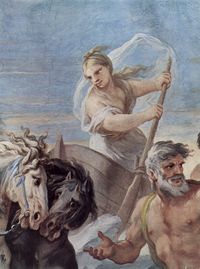
حكايات أخرى
According to the "Homeric Hymn to Apollo," when Leto was in labor prior to giving birth to Apollo and his twin sister Artemis, all the goddesses were in attendance except for two, Hera and Ilithyia, the goddess of childbirth. On the ninth day of her labor, Leto told Iris to bribe Ilithyia and ask for her help in giving birth to her children, without allowing Hera to find out.[6]
According to Apollonius Rhodius, Iris turned back the Argonauts Zetes and Calais, who had pursued the Harpies to the Strophades ('Islands of Turning'). The brothers had driven off the monsters from their torment of the prophet Phineus, but did not kill them upon the request of Iris, who promised that Phineus would not be bothered by the Harpies again.
In Euripides' play Herakles, Iris appears alongside Lyssa, cursing Heracles with the fit of madness in which he kills his three sons and his wife Megara.
تمثيل
Iris is represented either as a rainbow, or as a beautiful young maiden with wings on her shoulders. As a goddess, Iris is associated with communication, messages, the rainbow and new endeavors. This personification of a rainbow was once described as being a link to the heavens and earth.[7] In some texts she is depicted wearing a coat of many colors. With this coat she actually creates the rainbows she rides to get from place to place. Iris's wings were said to be so beautiful that she could even light up a dark cavern, a trait observable from in the story of her visit to Somnus in order to relay a message to Alcyone.[8]
Though Iris was principally associated with communication and messages, she was also believed to aid in the fulfillment of humans' prayers, either by fulfilling them herself or by bringing them to the attention of other deities.[9]
معرض صور
الهامش
- ^ روبرت بيكس رفض الاشتقاقات الهندو-أوروپية السابقة واقترح اشتقاقاً قبل يوناني (Etymological Dictionary of Greek, Brill, 2009, p. 598).
- ^ The Iliad, Book II, "And now Iris, fleet as the wind, was sent by Jove to tell the bad news among the Trojans."
- ^ Homer uses the form Ἀελλόπος, Iliad viii. 409
- ^ Mackie, Christopher John (2011). "The Homer Encyclopedia". Credo Reference.
- ^ McLeish, Kenneth. "Bloomsbury Dictionary of Myth". Credo Reference.
- ^ Grant, Michael (2002). "Who's Who in Classical Mythology, Routledge". Credo Reference.
- ^ Seton-Williams, M.V. (2000). Greek Legends and Stories. Rubicon Press. pp. 75–76.
- ^ Bulfinch, Thomas (1913). Bulfinch's Mythology: the Age of Fable, the Age of Chivalry, Legends of Charlemagne: Complete in One Volume. Thomas Y. Crowell Co.
- ^ Seton-Williams, M.V. (2000). Greek Legends and Stories. Rubicon Press. p. 9.
المراجع
- Grimal, Pierre, The Dictionary of Classical Mythology, 1996, ISBN 978-0-631-20102-1. "Iris" pp. 237–238
- Peyré, Yves, "Iris." 2009. In A Dictionary of Shakespeare's Classical Mythology (2009-), ed. Yves Peyré. http://www.shakmyth.org/myth/129/iris
- Smith, William; Dictionary of Greek and Roman Biography and Mythology, London (1873). "Iris"
وصلات خارجية
- "Iris" from Theoi.com
- Hesiod, the Homeric Hymns, and Homerica by Hesiod (English translation at Project Gutenberg)
- The Iliad by Homer (English translation at Project Gutenberg)
- The Argonautica, by c. 3rd century BC Apollonius Rhodius (English translation at Project Gutenberg)
